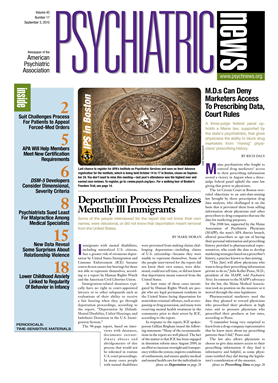Maine psychiatrists who fought to control drug marketers' access to their prescribing information scored a victory in August when a three-judge federal panel upheld the state law giving that power to physicians.
The 1st Circuit Court in Boston overruled objections to an anti-data-mining law brought by three prescription drug data analysts, who challenged it on the basis that it prevented them from selling information about physicians and other prescribers to drug companies that use the data for marketing purposes.
The 2008 law, supported by the Maine Association of Psychiatric Physicians (MAPP), the state's APA district branch, allowed prescribers to opt out of having their personal information and prescribing history provided to pharmaceutical representatives, who comb the data to develop marketing strategies based on a prescriber's history, a practice known as data mining.
“This [law] will allow physicians who want to keep their prescribing information private to do so,” Julie Keller Pease, M.D., president of the MAPP, told Psychiatric News. In contrast to the MAPP's advocacy for the law, the Maine Medical Association took no position on the measure as it moved through the state legislature.
Pharmaceutical marketers used the data they gleaned to reward physicians who prescribed their products at high rates and to pressure physicians who prescribed their products at low rates, according to Pease.
“I remember being very surprised to learn from a drug-company representative that he knew more about my prescribing patterns than I did,” Pease said.
The law also allows physicians to choose to give data miners access to their prescribing information if they find it informative and helpful, as some physicians testified they did during the legislature's consideration of the measure.
The appeals court ruling also lifts a preliminary injunction that barred enforcement of the 2008 law on the basis of an argument by the data miners that enforcing the law would violate their free-speech rights. The federal appeals panel concluded that the law blocks more activity than speech, but any speech that was blocked would fall under the category of commercial speech, which states have the authority to regulate.
The judges also noted that the state has a right to implement policies aimed at reducing health care costs. Supporters of the Maine law said that marketing based on prescribing history was used to drive physicians toward the more pricey medications being touted by marketers.
The appeals court decision could have broad implications because the 2nd U.S. Circuit Court of Appeals is reviewing a challenge to a similar law in Vermont.
